Choosing the best large breed puppy food for your Golden Retriever is one of the most important decisions you’ll make as a pet parent. Large breed puppies like Golden Retrievers have unique nutritional requirements that differ significantly from smaller breeds. The wrong food choice can lead to developmental issues, joint problems, and long-term health complications.
This comprehensive guide will help you understand everything about selecting the best puppy food for large breeds, specifically focusing on Golden Retrievers’ needs during their crucial growth period.
Contents
- 1 Understanding Large Breed Puppy Nutritional Needs
- 2 Signs Your Golden Retriever Puppy Needs Specialized Large Breed Food
- 3 Essential Nutritional Components in the Best Large Breed Puppy Food
- 4 Top Brands for Best Large Breed Puppy Food
- 5 Activity-Based Feeding for Golden Retriever Puppies
- 6 Best Food for Large Dog Transitioning from Puppy Food
- 7 Dry vs. Wet Food: Choosing the Best Large Breed Puppy Food Format
- 8 Homemade vs. Commercial Best Puppy Food for Large Breeds
- 9 Feeding Guidelines for Golden Retriever Puppies
- 10 Highest Rated Dog Food Brands for Large Breed Puppies
- 11 Special Dietary Considerations for Golden Retrievers
- 12 Transitioning Between Foods Safely
- 13 Cost Considerations for Best Large Breed Puppy Food
- 13.1 Price vs. Quality Analysis
- 13.2 Budget-Friendly Options
- 13.3 When should I start feeding my Golden Retriever puppy large breed formula?
- 13.4 How long should my Golden Retriever stay on puppy food?
- 13.5 Can I mix different brands of large breed puppy food?
- 13.6 How much should I feed my Golden Retriever puppy?
- 13.7 What ingredients should I avoid in large breed puppy food?
- 13.8 Is grain-free food better for Golden Retriever puppies?
- 13.9 How do I know if my puppy is getting proper nutrition?
- 13.10 Can I supplement my puppy’s diet with vitamins?
- 14 Final Thoughts
Understanding Large Breed Puppy Nutritional Needs
Large breed puppies grow at an incredible rate during their first 18 months, making proper nutrition absolutely critical. Golden Retriever puppies can gain 2-4 pounds per week during peak growth periods, requiring carefully balanced nutrition to support healthy development.
Why Large Breed Puppies Need Special Nutrition
Large breed dogs like Golden Retrievers face unique challenges during growth that smaller breeds don’t encounter. Their rapid growth rate combined with their eventual adult size creates specific nutritional requirements that must be met to prevent developmental issues.
The best large breed puppy food formulations are designed with controlled calcium and phosphorus levels, appropriate protein content, and specific caloric density to support healthy bone and joint development. Generic puppy foods often contain excessive nutrients that can cause large breed puppies to grow too quickly, leading to skeletal abnormalities.
Critical Growth Phases in Golden Retriever Puppies
Golden Retriever puppies experience several distinct growth phases, each requiring adjusted nutrition:
8-16 weeks: Rapid initial growth requiring high-quality protein and controlled minerals 4-6 months: Peak growth velocity demanding careful caloric management 6-12 months: Continued steady growth with focus on joint development 12-18 months: Final maturation phase transitioning to adult nutrition
Understanding these phases helps you select the best puppy food for large breeds and adjust feeding schedules accordingly.
Signs Your Golden Retriever Puppy Needs Specialized Large Breed Food
Several indicators suggest your Golden Retriever puppy requires specialized large breed nutrition rather than standard puppy food.
Physical Development Indicators
Monitor your puppy for rapid weight gain, excessive height growth, or joint stiffness. These signs often indicate the current food may be too nutrient-dense or inappropriate for large breed development.
Golden Retriever puppies should maintain a lean body condition during growth. If you can’t easily feel their ribs or notice excessive weight around the midsection, the best large breed puppy food with controlled calories may be necessary.
Behavioral and Activity Changes
Puppies experiencing joint discomfort from improper nutrition may show decreased playfulness, reluctance to jump or climb stairs, or unusual fatigue during normal activities. Switching to appropriate best puppy food for large breeds often resolves these issues.
Essential Nutritional Components in the Best Large Breed Puppy Food
Understanding key nutritional components helps you evaluate different food options and select the most appropriate formula for your Golden Retriever.
Protein Requirements for Large Breed Puppies
The best large breed puppy food contains 22-26% protein, providing essential amino acids for muscle development without promoting excessive growth rates. High-quality protein sources like chicken, fish, and lamb support healthy development while maintaining appropriate growth curves.
Avoid foods exceeding 30% protein, as excessive protein can contribute to rapid growth and potential skeletal issues in Golden Retrievers.
Calcium and Phosphorus Balance
Proper calcium-phosphorus ratios are crucial in the best puppy food for large breeds. Look for formulas containing 1.0-1.8% calcium with a calcium-to-phosphorus ratio between 1.2:1 and 1.4:1.
Excessive calcium supplementation can disrupt normal bone development, making it essential to choose foods with controlled mineral levels rather than adding supplements.
Fat Content and Energy Density
Large breed puppy foods should contain 8-12% fat content, providing necessary fatty acids without excessive calories that promote rapid growth. The best large breed puppy food formulations balance energy needs with controlled caloric density.
DHA (docosahexaenoic acid) from fish oil supports brain and eye development, making it a valuable component in premium large breed formulas.
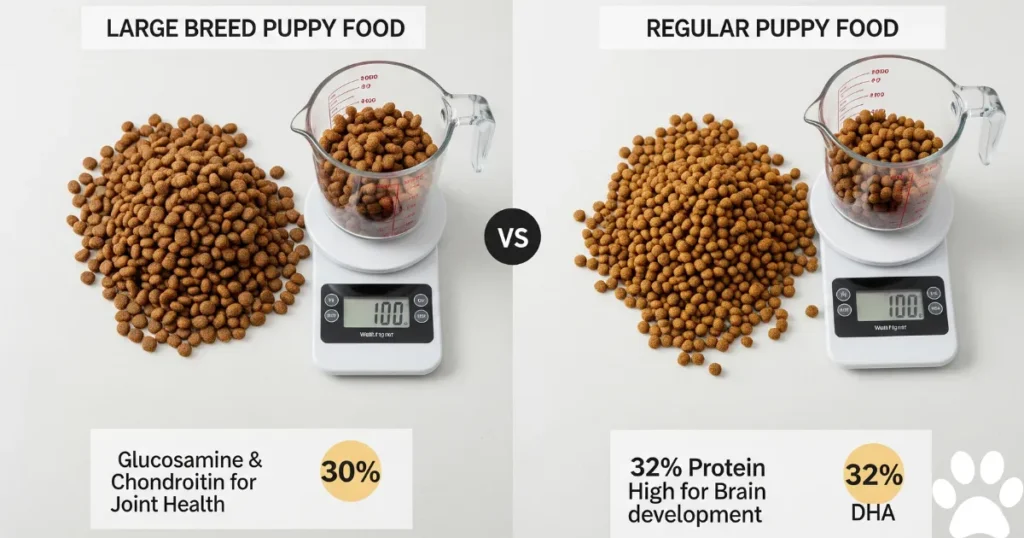
Top Brands for Best Large Breed Puppy Food
Several reputable brands manufacture high-quality large breed puppy foods specifically formulated for dogs like Golden Retrievers.
Premium Brand Options
Royal Canin Golden Retriever Puppy offers breed-specific nutrition addressing Golden Retrievers’ unique needs, including kibble shape designed for their jaw structure and specific nutrient profiles supporting their coat and skin health.
Hill’s Science Diet Large Breed Puppy provides clinically proven nutrition with controlled calcium levels and high-quality protein sources, making it excellent best puppy food for large breeds.
Purina Pro Plan Large Breed Puppy features live probiotics supporting digestive health and immune system development, crucial during the growth phase.
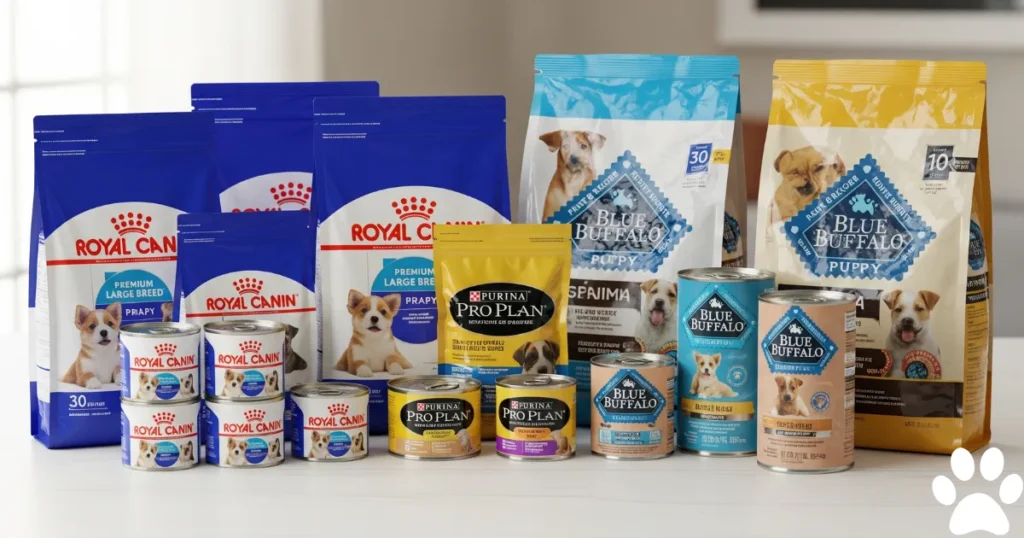
Budget-Friendly Quality Options
Blue Buffalo Life Protection Large Breed Puppy offers natural ingredients with deboned chicken as the first ingredient, providing excellent nutrition at moderate prices.
Nutro Ultra Large Breed Puppy combines multiple protein sources with whole grains and vegetables, creating well-balanced nutrition suitable for Golden Retriever development.
Top Large Breed Puppy Food Considerations
When evaluating different brands, consider your Golden Retriever’s individual needs, any food sensitivities, and your budget constraints. The top large breed puppy food for one dog may not suit another due to individual differences.
Activity-Based Feeding for Golden Retriever Puppies
Golden Retrievers are naturally active dogs, and their activity levels significantly impact nutritional requirements during puppyhood.
Feeding Active Puppies
Highly active Golden Retriever puppies may require additional calories from the best large breed puppy food, but increases should be gradual and monitored carefully. Active puppies burn more energy but still need controlled growth rates.
Consider feeding smaller, more frequent meals to active puppies to maintain energy levels while preventing overeating and rapid growth spurts.
Adjusting Portions Based on Activity
Monitor your puppy’s body condition regularly and adjust portions accordingly. The best puppy food for large breeds should maintain your Golden Retriever at an ideal body weight throughout the growth period.
Seasonal activity changes may require feeding adjustments, with more active summer months potentially requiring slight portion increases while winter months may need reductions.
Best Food for Large Dog Transitioning from Puppy Food
Understanding when and how to transition from puppy food to the Best Food for large dogs is crucial for Golden Retrievers.
Timing the Transition
Most Golden Retrievers should transition from the best large breed puppy food to adult formulas between 12-18 months of age, depending on individual development rates and skeletal maturity.
Consult with your veterinarian to determine the optimal transition timing based on your dog’s specific growth pattern and development.
Best Food for Large Breed Dogs During Transition
The transition should be gradual, mixing increasing amounts of adult big breed dog food with decreasing amounts of puppy food over 7-10 days. This prevents digestive upset and allows your dog to adjust to the new formula.
Dry vs. Wet Food: Choosing the Best Large Breed Puppy Food Format
Both dry and wet foods can provide excellent nutrition for Golden Retriever puppies, each offering distinct advantages.
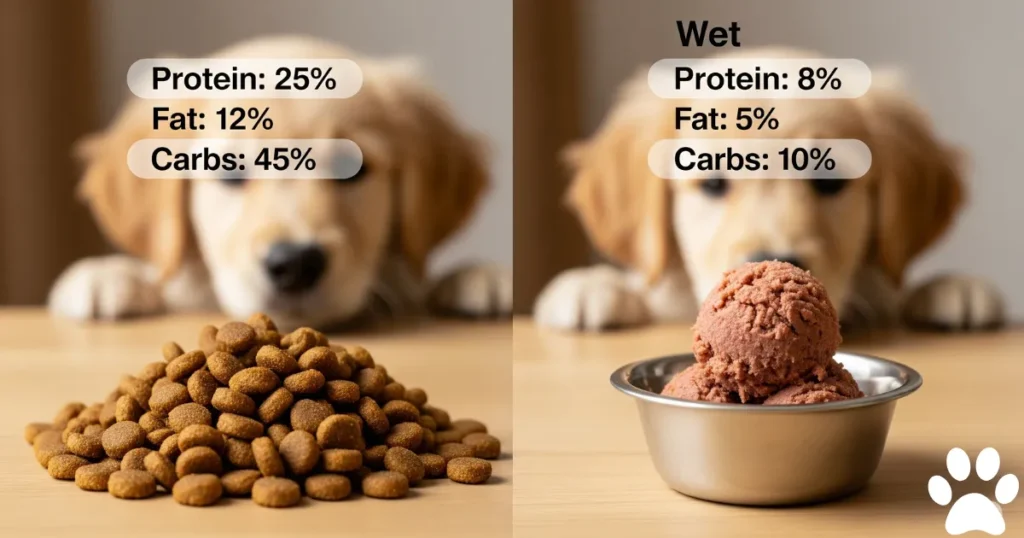
Best Large Breed Dry Dog Food Benefits
Dry kibble promotes dental health through natural chewing action and typically costs less per serving than wet alternatives. The best dry food for large dogs offers convenience and longer shelf life once opened.
Many veterinary nutritionists recommend dry food for large breed puppies due to controlled caloric density and ease of portion measurement.
Wet Food Advantages
Wet foods provide higher moisture content, which can benefit puppies who don’t drink enough water. Some picky Golden Retriever puppies find wet food more palatable than dry kibble.
Combining wet and dry foods can provide benefits of both formats while maintaining nutritional balance.
Mixed Feeding Approach
Many Golden Retriever owners successfully use mixed feeding, combining the best large breed puppy food in dry format with small amounts of high-quality wet food for palatability and moisture content.
Homemade vs. Commercial Best Puppy Food for Large Breeds
While homemade diets can provide excellent nutrition, commercial foods offer convenience and guaranteed nutritional completeness for growing Golden Retrievers.
Commercial Food Benefits
The best large breed puppy food from reputable manufacturers undergoes extensive testing and formulation to meet AAFCO (Association of American Feed Control Officials) standards for growth and development.
Commercial foods provide consistent nutrition without the risk of nutrient deficiencies or imbalances common in homemade diets.
Homemade Diet Considerations
Homemade diets require extensive nutritional knowledge and veterinary guidance to ensure proper nutrient ratios for large breed development. Mistakes in homemade formulations can have serious consequences for Golden Retriever puppies.
If considering homemade feeding, work with a veterinary nutritionist to develop appropriate recipes meeting large breed puppy requirements.
Fresh Dog Food Options
Commercial fresh dog food delivery services offer middle-ground solutions, providing fresh ingredients in nutritionally balanced formulas designed for large breed puppies.
These services often use human-grade ingredients while maintaining the nutritional expertise of commercial formulations.
Feeding Guidelines for Golden Retriever Puppies
Proper feeding schedules and portion control are essential components of providing the best puppy food for large breeds.
Age-Based Feeding Schedules
8-12 weeks: Feed 4 times daily with measured portions of best large breed puppy food 3-6 months: Reduce to 3 meals daily while monitoring growth rates 6-12 months: Transition to twice-daily feeding with continued portion monitoring 12+ months: Maintain twice-daily feeding while transitioning to adult food
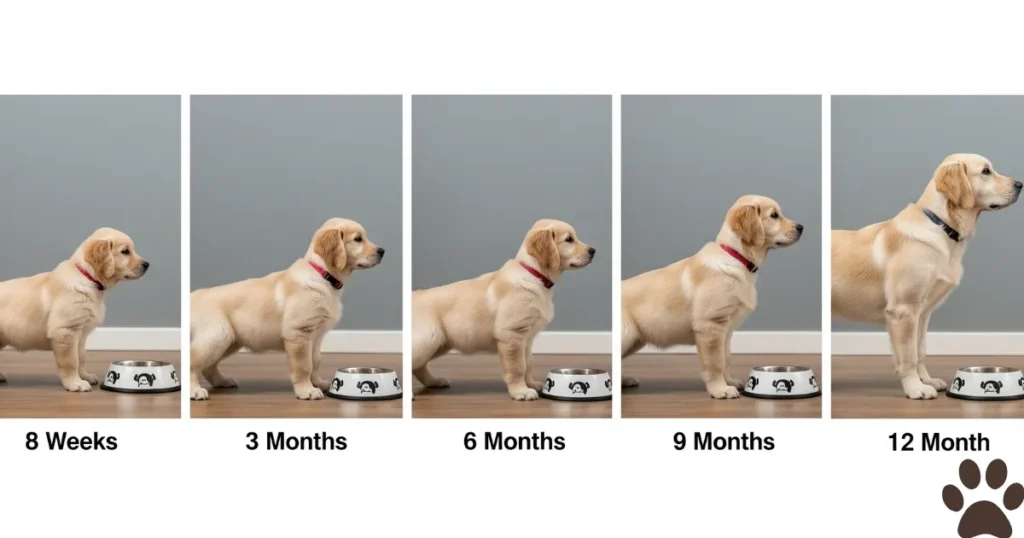
Portion Control Methods
Use measuring cups rather than estimating portions to ensure consistent feeding. The feeding guidelines on best large breed puppy food packages provide starting points, but individual dogs may require adjustments.
Monitor body condition weekly and adjust portions based on your puppy’s individual needs rather than strictly following package recommendations.
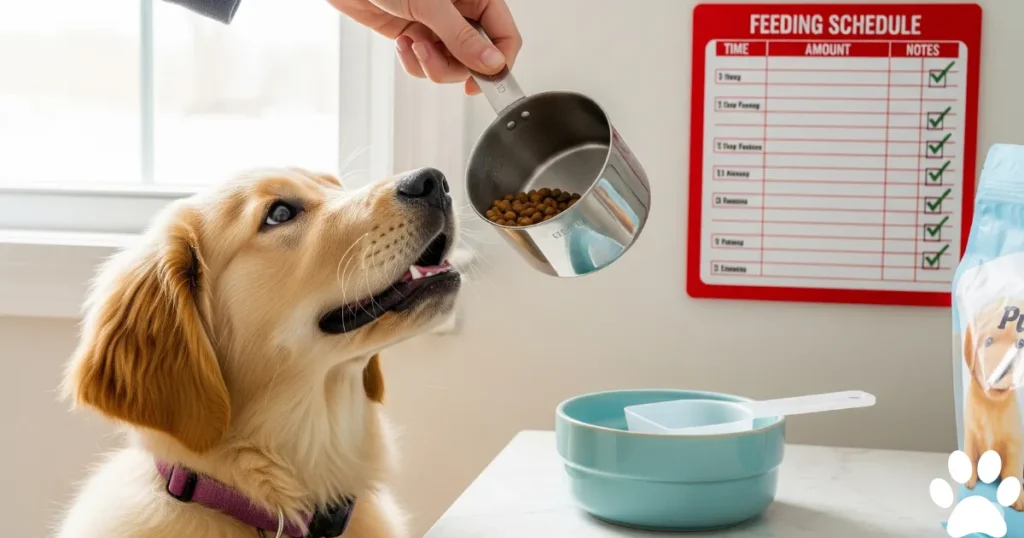
Free Feeding vs. Scheduled Meals
Scheduled meals are strongly recommended for Golden Retriever puppies using the best puppy food for large breeds. Free feeding can lead to overeating, rapid growth, and difficulty monitoring food intake.
Scheduled feeding also supports house training efforts and helps establish routine for your growing puppy.
Highest Rated Dog Food Brands for Large Breed Puppies
Consumer ratings and veterinary recommendations help identify the most trusted brands for large breed nutrition.
Veterinary-Recommended Brands
Veterinarians frequently recommend specific brands based on clinical experience and nutritional research. These recommendations often focus on brands with proven track records in large breed development.
Hill’s Science Diet, Royal Canin, and Purina Pro Plan consistently receive high ratings from veterinary professionals for large breed puppy nutrition.
Consumer Rating Factors
Pet owners rate foods based on palatability, visible health improvements, coat quality, and energy levels. The highest rated dog food often combines veterinary approval with positive consumer experiences.
Online reviews and ratings can provide valuable insights, but veterinary guidance should always be the primary consideration when selecting nutrition for your Golden Retriever puppy.
Special Dietary Considerations for Golden Retrievers
Golden Retrievers may have specific dietary needs or sensitivities that influence food selection beyond general large breed requirements.
Common Food Sensitivities
Some Golden Retrievers develop sensitivities to common ingredients like chicken, beef, or grains. The best large breed puppy food for sensitive dogs may require limited ingredient formulas or novel protein sources.
Monitor your puppy for signs of food sensitivities including digestive upset, skin issues, or excessive scratching.
Coat and Skin Health
Golden Retrievers’ beautiful coats require specific nutrients including omega-3 and omega-6 fatty acids. The best puppy food for large breeds should include these nutrients to support coat development and skin health.
Foods containing fish oil, flaxseed, or other sources of essential fatty acids contribute to the lustrous coat Golden Retrievers are known for.
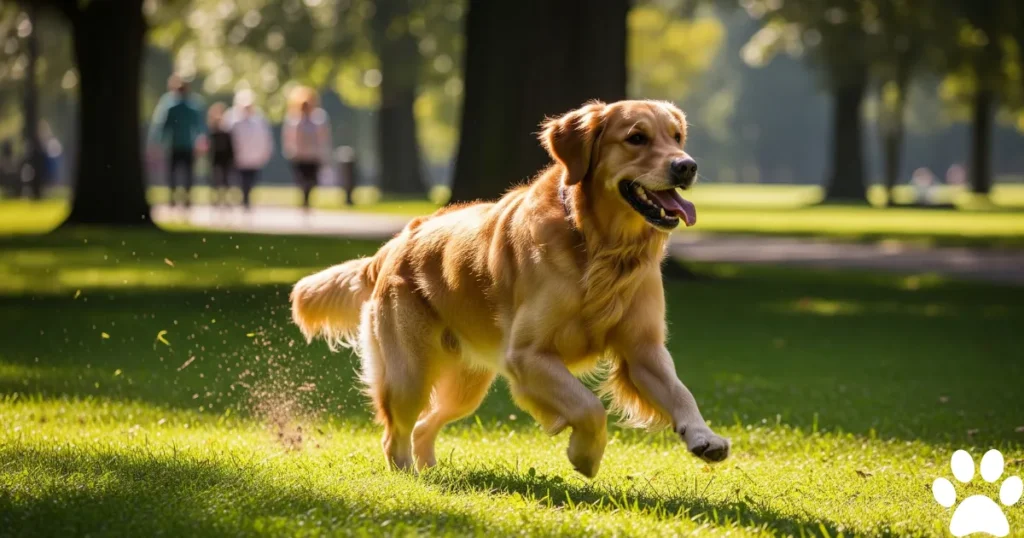
Joint Health Support
Large breed puppies benefit from foods containing glucosamine and chondroitin sulfate for joint health support. While not essential in puppy food, these ingredients can provide additional support during rapid growth periods.
Transitioning Between Foods Safely
Proper food transitions prevent digestive upset and ensure your Golden Retriever accepts new formulas readily.
Gradual Transition Protocol
Spend 7-10 days transitioning between different best large breed puppy food formulas:
- Days 1-2: 75% old food, 25% new food
- Days 3-4: 50% old food, 50% new food
- Days 5-6: 25% old food, 75% new food
- Days 7+: 100% new food
Monitoring During Transitions
Watch for digestive upset, changes in appetite, or behavioral changes during food transitions. Some adjustment period is normal, but persistent issues may indicate the new food isn’t suitable.
Keep records of your puppy’s response to different foods to help identify preferences and sensitivities for future reference.
Cost Considerations for Best Large Breed Puppy Food
Quality nutrition is an investment in your Golden Retriever’s long-term health, but budget considerations are important for most pet owners.
Price vs. Quality Analysis
The best puppy food for large breeds may cost more initially but can prevent expensive health problems later. Compare cost per feeding rather than cost per bag to understand true value.
Higher-quality foods often have better digestibility, meaning you feed smaller portions and get more value from each bag.
Budget-Friendly Options
Several manufacturers offer quality large breed puppy foods at moderate prices. Focus on foods meeting AAFCO standards rather than premium marketing claims.
Buying larger bags typically reduces cost per pound, but ensure you can use the food before expiration dates.
When should I start feeding my Golden Retriever puppy large breed formula?
Start feeding best large breed puppy food immediately after bringing your Golden Retriever puppy home, typically around 8 weeks of age. Large breed puppies need specialized nutrition from the beginning of their growth period to prevent developmental issues.
How long should my Golden Retriever stay on puppy food?
Golden Retrievers should continue eating best puppy food for large breeds until 12-18 months of age, depending on individual development. Consult your veterinarian to determine the optimal transition timing based on your dog’s growth rate and skeletal maturity.
Can I mix different brands of large breed puppy food?
While possible, mixing different best large breed puppy food brands can complicate nutritional balance and make it difficult to identify food sensitivities. If mixing foods, do so gradually and ensure both foods meet large breed nutritional requirements.
How much should I feed my Golden Retriever puppy?
Feeding amounts vary based on age, weight, and activity level. Start with manufacturer recommendations on the best large breed puppy food package and adjust based on your puppy’s body condition. Most Golden Retriever puppies need 2-4 cups daily, divided into multiple meals.
What ingredients should I avoid in large breed puppy food?
Avoid foods with excessive calcium (over 1.8%), high fat content (over 15%), and generic protein sources. The best puppy food for large breeds should also avoid artificial preservatives, colors, and fillers like corn syrup.
Is grain-free food better for Golden Retriever puppies?
Grain-free foods aren’t necessary for most Golden Retrievers unless they have specific grain allergies. Some grain-free formulas have been linked to heart issues in dogs. The best large breed puppy food with appropriate grains can provide excellent nutrition.
How do I know if my puppy is getting proper nutrition?
Monitor your Golden Retriever’s energy levels, coat quality, body condition, and growth rate. Puppies eating the best large breed puppy food should have steady weight gain, glossy coats, and appropriate energy levels for their age.
Can I supplement my puppy’s diet with vitamins?
Avoid supplementing complete and balanced best puppy food for large breeds unless recommended by your veterinarian. Excess supplementation, particularly calcium, can cause developmental problems in large breed puppies.
Final Thoughts
Selecting the best large breed puppy food for your Golden Retriever is a critical investment in their lifelong health and happiness. Throughout this comprehensive guide, we’ve explored the unique nutritional requirements that set large breed puppies apart from their smaller counterparts, emphasizing why generic puppy foods aren’t adequate for Golden Retrievers’ specialized needs.
The journey of choosing the best puppy food for large breeds involves understanding your Golden Retriever’s rapid growth phases, monitoring their individual development, and adjusting nutrition accordingly. From the initial 8-week mark through their 18-month maturation period, every feeding decision impacts their skeletal development, joint health, and overall wellbeing.
Remember that the highest-priced food isn’t always the best choice for your specific puppy. Focus on foods that meet AAFCO standards for large breed growth, contain appropriate calcium and phosphorus ratios, and use high-quality protein sources. Whether you choose top large breed puppy food brands like Royal Canin and Hill’s Science Diet, or opt for quality budget-friendly options, consistency in feeding schedules and portion control remains paramount.
As your Golden Retriever transitions from puppyhood to adulthood, the nutritional foundation you provide during these crucial months will influence their energy levels, coat quality, joint health, and longevity. The best food for large breed dogs during puppyhood sets the stage for a lifetime of optimal health.
Continue monitoring your Golden Retriever’s body condition, consult regularly with your veterinarian, and don’t hesitate to adjust feeding plans as your puppy’s individual needs become apparent. With proper nutrition during these formative months, you’re giving your Golden Retriever the best possible start for a healthy, active, and joyful life as your beloved companion.
Featured Blogs
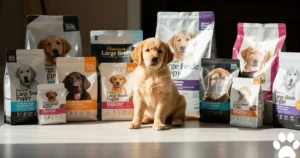
Top Large Breed Puppy Food: Expert Rankings and Reviews for Golden Retriever Owners
Finding the top large breed puppy food for your Golden Retriever can feel overwhelming with countless options flooding the market....
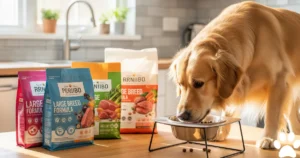
Best Food for Large Breed Dogs: Complete Nutrition Guide for Golden Retrievers – 2025
Selecting the best food for large breed dogs is crucial for maintaining your Golden Retriever's health, energy levels, and longevity...
Dr. Nabeel A.
Hi, I’m Dr. Nabeel Akram – a farm management professional by trade and a passionate Golden Retriever enthusiast at heart. With years of experience in animal science and livestock care, I’ve built a career around understanding animals—how they live, thrive, and bring value to our lives. This blog is a personal project born from that same passion, focusing on one of the most loyal and lovable breeds out there: the Golden Retriever. Whether I’m managing farm operations or sharing insights on canine health, behavior, and care, it all ties back to one core belief—animals deserve thoughtful, informed, and compassionate attention. Welcome to a space where professional expertise meets genuine love for dogs.
Facebook |
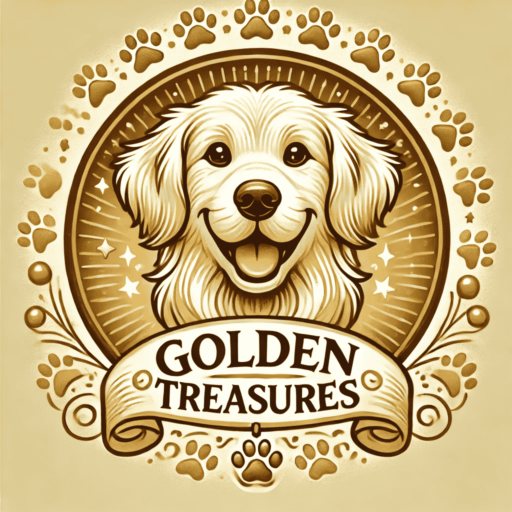
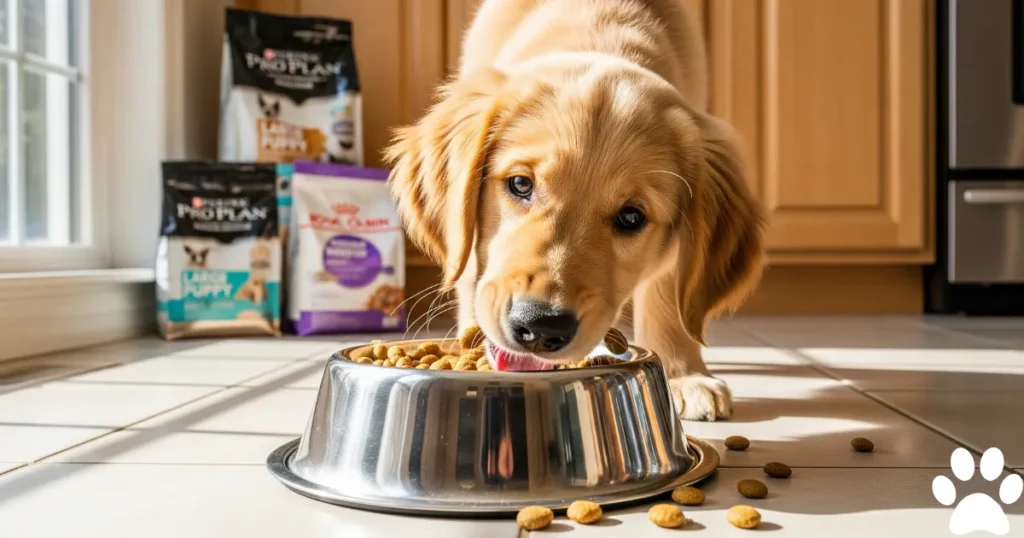
Links will be automatically removed from comments.